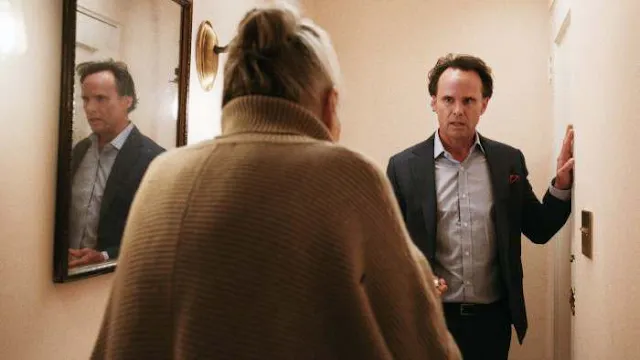'The Uninvited' explores Hollywood's glitzy panic and quiet downfall
In "The Uninvited," director Nadia Conners crafts a sharp, intimate portrait of one night in Hollywood's fading dreamscape.
 |
| Walton Goggins and Lois Smith (seen from behind) in “The Uninvited.” (c) Foton Pictures |
By Novanka Laras and Hayu Andini
The Uninvited review opens on a city still struggling with its own myth. Amid ongoing political rhetoric promising to "save" the American film industry, Nadia Conners delivers a tightly woven chamber piece that reflects on that very culture’s decline. Shot entirely on location in Los Angeles—a rarity in modern productions—the film itself becomes both a product of and commentary on the very industry it portrays.
Palm trees sway, a luminous pool beckons, and somewhere inside a lavish retro villa in the Hollywood Hills, regret takes center stage. The Uninvited invites viewers into one night of curated revelry, lingering glances, and slowly unraveling truths.
A party soaked in quiet desperation
The opening sequence feels like a visual postcard from a still-seductive city. But beneath the surface, unease simmers. We’re introduced to Rose (played with sublime restraint by Elizabeth Reaser), a middle-aged actress whose career has flatlined. She sighs—audibly, emotionally—while palm trees frame her quiet despair. Her husband Sammy (Walton Goggins), an agent with all the right connections, has organized an intimate gathering of industry insiders, each one carrying a mix of privilege and emotional fatigue.
From the outset, The Uninvited review reveals a layered screenplay by writer-director Nadia Conners, who slowly guides us through a maze of old memories, minor betrayals, and unspoken tensions. While glitzy on the surface, the tone is one of introspection rather than extravagance.
Ensemble drama with theatrical sharpness
The film’s strength lies in its ensemble. Pedro Pascal plays a once-troubled movie star now trying sobriety, adding nuance to a character that could’ve easily leaned on trope. Rufus Sewell brings delicious charm to the role of a fading director, whose charisma barely masks a bruised ego. Their interactions are sprinkled with wit, underlying tension, and existential uncertainty.
And then there's the unexpected guest: an elderly woman (Lois Smith) claiming she once lived in the house during her own Hollywood heyday. Her arrival introduces a ghostly thread to the narrative—less supernatural, more symbolic. Shades of Sunset Boulevard are undeniable, but Conners carefully avoids mimicry. Instead, she uses homage to propel her own story, rooted in the now.
A tightly framed exploration of identity
Unlike sprawling Hollywood epics, The Uninvited feels almost claustrophobic by design. Conners keeps the camera close, the rooms narrow, and the action intimate. The result is a film that feels more like a stage play—dialogue-driven, filled with charged glances and silences that say more than monologues.
This tone is reinforced by Conners' real-life connection to her cast. Married to Goggins and long-time friends with Pascal, she uses the genuine chemistry between them to fuel onscreen dynamics. There's an authenticity here that can't be manufactured. Even the location—a friend's house used as the shoot’s sole set—adds a layer of closeness rarely found in Hollywood productions.
Rose at the center: emotional resonance without melodrama
At the core of this review of The Uninvited is Rose, a character who refuses to be pitied. Reaser inhabits her with a restrained dignity, letting her frustration, insecurity, and tenderness flicker through in moments. She’s a host, a mother, a wife—and a woman coming to terms with the life that didn’t quite turn out as promised.
The film avoids grand declarations. Instead, it leans into ambiguity, letting each character’s silence or half-uttered line hang in the air. Rose’s inner conflict is never spelled out but always felt. Her journey anchors the film and gives it an emotional core that resonates long after the credits roll.
Hollywood nostalgia meets a quiet elegy
Midway through the film, Sewell delivers a monologue about the myth-making power of directors—part satire, part confession. It’s a brilliant moment that encapsulates the dual tone of the film: self-aware and sincere. The Uninvited knows what it is. It doesn’t shy away from the clichés of industry parties or the archetypes of fading fame. But it reframes them through a lens of wistful intimacy.
There are hints of storm clouds—literal and metaphorical—as characters talk about leaving town, missed chances, and the shifting landscape of streaming and studio control. The ghosts here aren’t just old stars or forgotten scripts, but the American Dream itself.
Not quite noir, not quite satire
What makes The Uninvited stand out is its refusal to be boxed into genre. It’s not quite a Hollywood noir, despite its shadows. It’s not satire, though it glances at the absurd. And it isn’t a murder mystery, even though one seems to be brewing. Instead, it’s a human drama, pared down to its essential questions: Who am I when the spotlight fades? What happens after the dream ends?
The final act doesn’t explode—it lingers. Conversations trail off. Characters depart without resolution. It’s this emotional restraint that gives the film its power. In a city obsessed with reinvention, The Uninvited quietly insists on reflection.
Final thoughts on The Uninvited
As a model for Hollywood’s future, the production itself—intimate, self-funded, community-driven—has clear limitations. But as a story, The Uninvited delivers an experience that’s both richly cinematic and deeply personal. Nadia Conners proves that the heart of the industry isn’t found in spectacle, but in truth.
This Hollywood drama film manages to capture something elusive: the moment when performance gives way to reality, when the show ends but the emotions linger. As a narrative, it’s compact. As a mood, it’s haunting.
For anyone wondering if Hollywood can still produce work that feels raw and real, The Uninvited is your answer.
